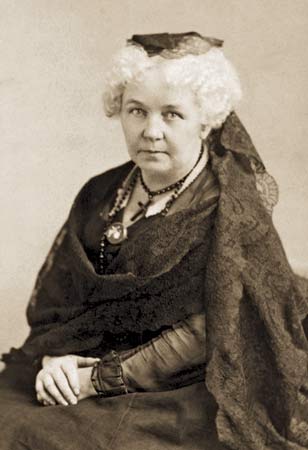Elizabeth Cady Stantonová citáty a výroky
Elizabeth Cady Stantonová: Citáty anglicky
Letter to Susan B. Anthony (1860-06-14).
Kontext: Women's degradation is in man's idea of his sexual rights. Our religion, laws, customs, are all founded on the belief that woman was made for man. Come what will, my whole soul rejoices in the truth that I have uttered.
Declaration of Sentiments, Seneca Falls Convention (July 19-20, 1848).
Kontext: The history of mankind is a history of repeated injuries and usurpations on the part of man toward woman, having in direct object the establishement of an absolute tyrrany over her... He has never permitted her to exercise her inalienable right to the elective to the franchise. He has compelled her to submit to laws, in the formation of wich she has no voice...
Having deprived her of this first right of a citizen, the elective franchise, thereby leaving her without representation in the halls of legislation, her has oppressed her on all sides. He has made her, if married, in the eye of the law, civilly dead.
The Woman's Bible (1898)
Zdroj: The Woman's Bible: A Classic Feminist Perspective
Solitude of Self (1892)
Solitude of Self (1892)
“To make laws that man cannot, and will not obey, serves to bring all law into contempt.”
Address to the Tenth National Women's Rights Convention on Marriage and Divorce, New York City, May 11, 1860; as published in Elizabeth Cady Stanton, Feminist as Thinker: A Reader in Documents and Essays edited by Ellen Carol DuBois and Richard Cándida Smith.
“We hold these truths to be self-evident, that all men and women are created equal.”
First Woman's Rights Convention, Seneca Falls, New York, [July, 19-20, 1848]. Declaration of Sentiments.
Letter to Thomas Wentworth Higginson (1868-01-13).
Speech before the New York Legislature (1860-02-18).
1896
September
The Degraded Status of Woman in the Bible
Free Thought Magazine
Chicago
14
540
http://books.google.com/books?id=TfOfAAAAMAAJ&pg=PA540&dq=%22I+have+endeavored+to+dissipate%22
Letter to Lucretia Mott (1872-04-01).
As quoted in Fateful Lightning: A New History of the Civil War and Reconstruction https://books.google.com/books?id=Tpb7HAIhWHgC&printsec=frontcover&dq=9780199843282&hl=en&sa=X&ved=0ahUKEwjz1ILxqfLcAhVDnuAKHda9Ai0Q6AEIKDAA#v=onepage&q=9780199843282&f=false (2012), by Allen C. Guelzo, Chapter One
